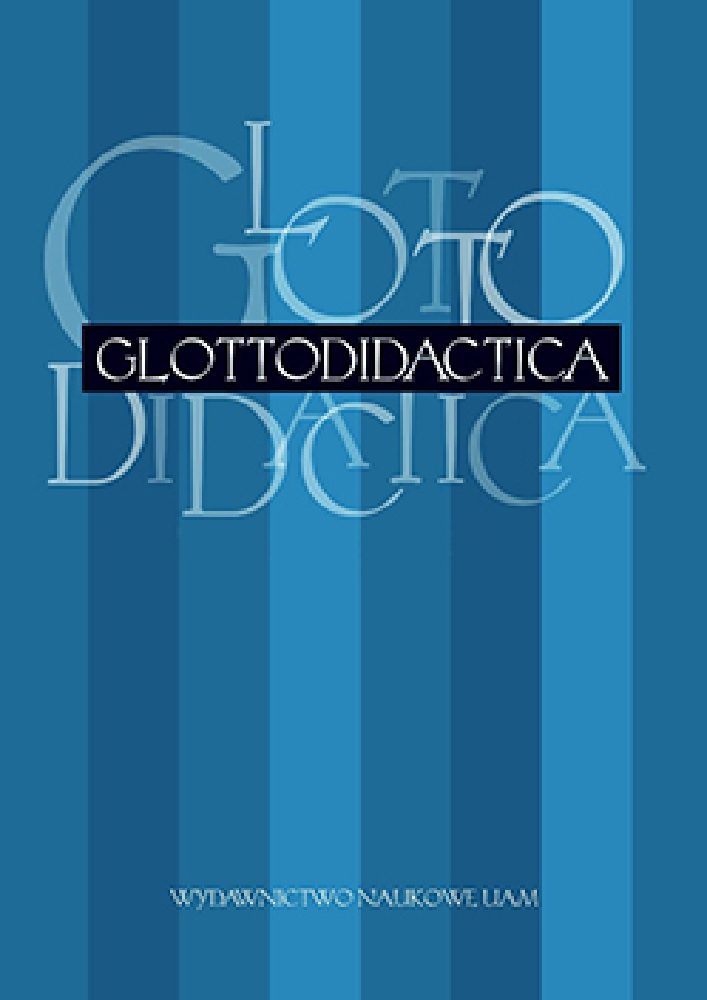Abstract
In contemporary academia, there are no mono-semantic definitions of either applied linguistics or discursive syntax. I analyse how applied linguistics is understood in Russia, Poland and Germany, and present syntax as a part of applied intercultural linguistics. The analysed data are reflective texts by Russian and German participants of the intercultural project “Rilke and Russia” that took place in 2019, in Samara. I consider these texts for reflective discourse appearing as a result of speech acts realised as self-talk. In my analyses, I use methods that are specific for speech acts research on the one hand, and that are typical of syntax on the other. So, I identify the role subjects, their intentionality and the persons addressed. Then, I compare the syntactic means used by Russian and German role subjects and show that these means are influenced by national culture and mentality.
References
Arutiunova, N.D. (1981). Faktor adresata. Izvestija AN SSSR. Serija literatury i jazyka, 40 (4), 356–367.
Baranov, A.N. (2003). Vvedenije v prikladnuju lingvistiku. Moskwa: Editorial URSS.
Beliao, Ju. / Lachert, A. (2013). Disfluency and discursive markers: When prosody and syntax plan discourse. The 6th workshop on disfluency in spontaneous speech, at Stockholm, Sweden, 54 (1), 5–8.
Bondarko, A.V. (1991). Vopros o lice subiekta v lice objekta. In: A.V. Bondarko et al. (Hrsg.), Teorija funkcjionalnoj grammatiki. Personalnost. Zagolovnost (S. 14–19). Sankt–Petersburg: Nauka.
Cerquiglini, B. / Hoffman, C. / Pelizzari, D. / Nichols, S.G. (1986). The syntax of discursive authority: The example of feminine discourse. Yale French Studies, 70: Images of power medieval history / discourse / literature, 183–198. DOI: https://doi.org/10.2307/2929855
Dementjev, V.V. (2013). Kommunikativnyje cennosti russkoj kultury: kategoria personalnosti v leksike i pragmatike. Moskwa: Global kom.
Fiehler, R. (2015). Syntaktische Phänomene in der gesprochenen Sprache. In: Ch. Dürscheid / J. G. Schneider (Hrsg.), Handbuch Satz, Äußerung, Schema (S. 370–395). Berlin [u.a.]: De Gruyter. DOI: https://doi.org/10.1515/9783110296037-017
Foucault, M. (2002). The archeology of knowledge. New York: Routledge.
Haber, O. (2017). Wortschatzarbeit motivierend gestalten. In: O. Haber (Hrsg.), Für die Praxis. Materialien für die berufsbezogene Sprachbildung. Bd. 5. Hamburg: Fachstelle Berufsbezogenes Deutsch im Förderprogramm IQ. http://www.deutsch-am-arbeitsplatz.de/fileadmin/user_upload/PDF/10_Fachstelle/05_BS_Wortschatzarbeit_Web.pdf [Zugriff am 25.09.2020].
Karasik, V.I. (1999). Harakteristika pedagogicheskogo diskursa. In: V.I. Karasik (Hrsg.), Jazykovaja lichnost’: aspekty lingvistiki i lingvodidaktiki: Sb. nauchnykh trudov. Volgograd: Peremena.
Kaschkin, V.B. ( 2002). Bytovaja filosofija jazyka i jazykovyje kontrasty. In: V.B. Kaschkin (Hrsg.), Teoreticheskaja i prikladnaja lingvistika. Vyp. 3: Aspekty metakommunikativnoj dejatelnosti (S. 4–34). Voronez: VGTU.
Kiklewicz, A. (2011). Kategorien der interkulturellen Linguistik in systembezogener Auffassung. In: C. Földes (Hrsg.), Interkulturelle Linguistik im Aufbruch. Das Verhältnis von Theorie, Empirie und Methode (S. 59–75). Tübingen: Narr Francke Verlag.
Kostrova, O. (2011). Diskurstypen und -erscheinungsformen. In: M.L. Kotin / E.G. Kotorova (Hrsg.), Sprache in Aktion. Pragmatik. Sprechakte. Diskurs (S. 157–166). Heidelberg: Universitätsverlag Winter.
Kostrova, O.A. (1992). Prodolzhennaja sintaksicheskaja forma kak promezhutochnoje zveno mezhdu prostym predlozhenijem i sverhfrazovym jedinstvom. Avtoref. dis. dokt. filol. nauk. Moskwa: In-t jazykoznanija RAN.
Kostrova, O.A. (2004). Ekspressivnyj sintaksis sovremennogo nemeckogo jazyka. Moskwa: Flinta. MPSI.
Kostrova, O.A. (2009). Tekst i diskurs: granicy i perehody. In: N.S. Babenko (Hrsg.), Russkaja germanistika. T. VI: Granicy v jazyke, literature i nauke (S. 348–355). Moskwa: JaSK.
Kostrova, O.A. / Sobchakova N.M. (2011). Slozhnopodchinennyje predlozhenija s pridatochnymi vremeni v nemeckom i anglijskom jazykah. Samara: PGSGA.
Kotin M.L. (2011). Ik gihôrta đat seggen… Modalität, Evidentialität, Sprachwandel und das Problem der grammatischen Kategorisierung. In: G. Diewald / E. Smirnova (Hrsg.), Modalität und Evidentialität. Modality and Evidentiality (S. 35–48). Trier: Wissenschaftlicher Verl.
Kuße, H. (2011). Kulturwissenschaftliche Linguistik. In: C. Földes (Hrsg.), Interkulturelle Linguistik im Aufbruch (S. 117–136). Tübingen: Narr. DOI: https://doi.org/10.36198/9783838537450
Labov, W. (1972). The transformation of experience in narrative syntax. In: W. Labov (Hrsg.), Language in the inner city (S. 354–396). Oxford: Basil Blackwell.
Liedtke, F. (2011). Sprechakte und pragmatische Anreicherung. In: M.L. Kotin / E.G. Kotorova (Hrsg.), Sprache in Aktion (S. 131–144). Heidelberg: Universitätsverlag Winter.
Myczko, K. (2010). Reflexion als Schlüsselphänomen der gegenwärtigen Fremdsprachendidaktik. Frankfurt a. M.: Peter Lang.
Prokop, I. (2020). Einige sprechakttheoretische Überlegungen zur Kommunikation im Unterricht (Manuskript. Zu erscheinen in der Festschrift für Prof. Dr. Kazimiera Myczko 2020) [im Druck].
Serl, J.-P. (1987). Priroda intencionalnyh sostojanij. In: V.V. Petrova (Hrsg.), Filosofija, logika, jazyk. Moskwa: Progres. https://Texas/filosofija – ucebnik – besplatno/ djon –serl-priroda. Intensionalnyih-18262.html [Zugriff am 25.09.2020].
Sternin, I.A. (2002). Nemeckij jazyk v russkom kommunikativnom soznanii. In: V.B. Kaschkin (Hrsg.), Teoreticheskaja i prikladnaja lingvistika. Vyp. 3: Aspekty metakommunikativnoj dejatelnosti (S. 114–119). Voronezh: VGTU.
Tiukow, A.A. (1987). O putiach opisanija psichołogiczeskich miechanizmow riefleksii. In: I.S. Ładienko (Hrsg.), Problemy riefleksii: Sowriemiennyje kompleksnyje issledowanija (S. 68–75). Nowosibirsk: Nauka.
License
Copyright (c) 2020 Olga Kostrova

This work is licensed under a Creative Commons Attribution-NoDerivatives 4.0 International License.
Authors
Authors of texts accepted for publication in Glottodidactica are required to complete, sign and return to the Editorial team’s office the Agreement for granting a royalty-free license to works with a commitment to grant a CC sub-license.
Under the agreement, the authors of the texts published in Glottodidactica grant Adam Mickiewicz University in Poznań a non-exclusive, royalty-free license and authorize the use of Attribution-NoDerivatives 4.0 International (CC BY-ND 4.0) Creative Commons sub-license.
The authors retain the right to the free disposal of the work.
Users
Interested Internet users are entitled to use works that have been published in Glottodidactica since 2016, under the following conditions:
▪ attribution – obligation to provide, together with the distributed work, information about the authorship, title, source (link to the original work, DOI) and the license itself.
▪ no derivatives – the work must be preserved in its original form. Without the author's consent, it is not possible to distribute the modified work in the form of translations, publications, etc.
Copyrights are reserved for all texts published before 2016.
Miscellaneous
Adam Mickiewicz University in Poznań retains the property right as a whole (layout, graphic form, title, cover design, logo etc.).
Privacy statement
The names and email addresses published on this journal site will be used exclusively for the purposes declared by this journal and cannot be used for any other purpose or by any other party.





